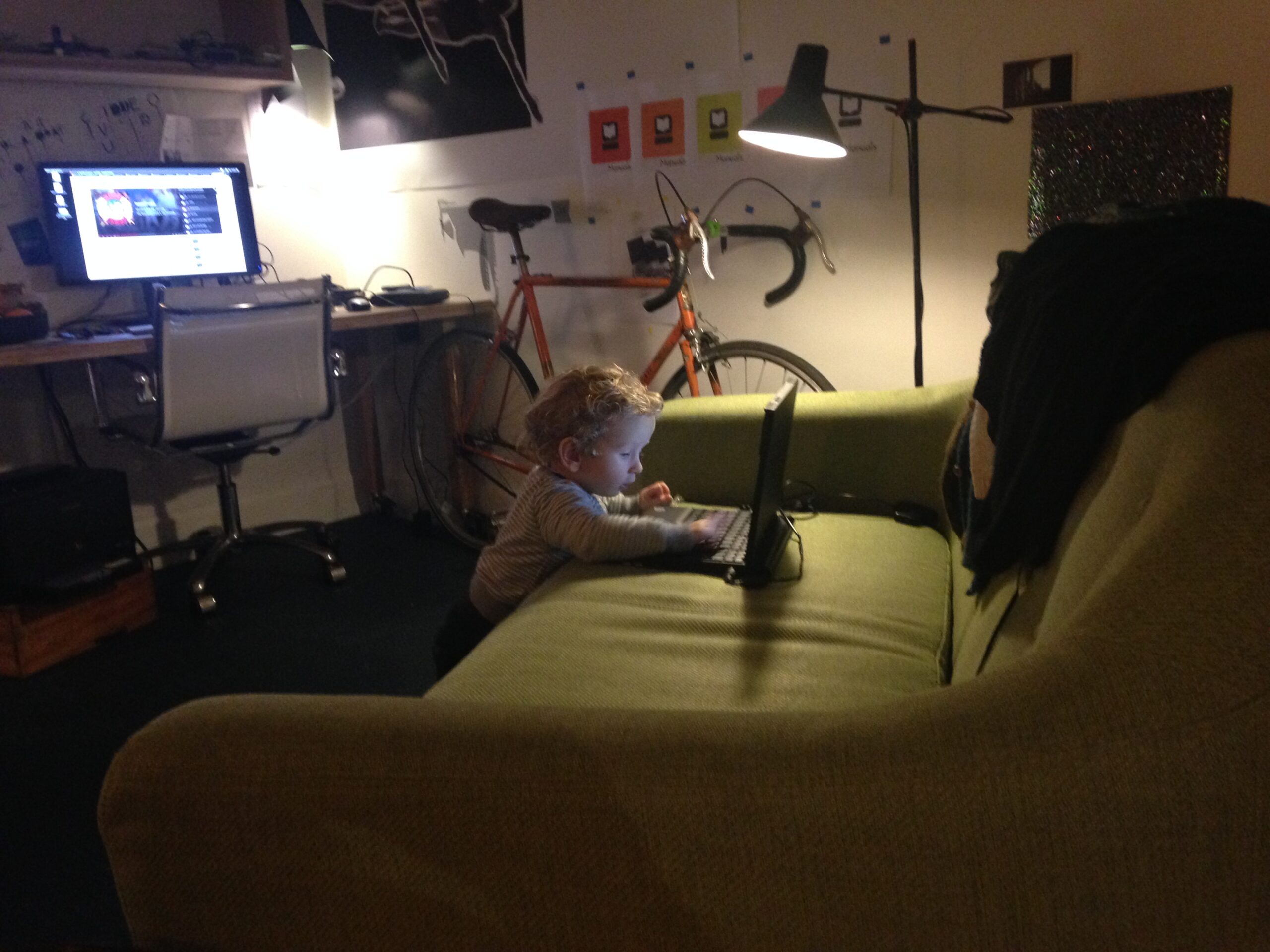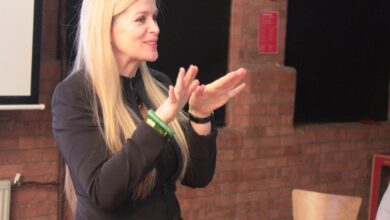
Wired Kids: Raising the Digital Natives
Photo by Ilze Black
Morgan Reede on the need to look beyond the future implications of technology as an exclusively adult concern.
Can you recall your most prized childhood memory?
I can recall being five or so, sat knee-deep in the sandbox in our back garden, mixing mud pies topped with a delicate grass-garnish, proclaiming to my imaginary garden audience that the perfect mud pie made a great garden party dish. I would build sand forts and parade rock armies across the treacherous sand terrain until it became dark enough for the back garden lights to come on, and my parents to eventually drag me in for dinner.
Think back now on your own memory—the voices playing around you, the variation of light, the sheer scale of the room, the way every rich detail fills the space to cement that specific time in your mind. Now imagine at that very moment, in that same memory, someone comes along and places a tablet screen in front of you, its bright light blinds out every other detail while colourful characters flash wildly across the display. At once, you are pacified by its message: pay attention.
How greatly does the screen begin to change the circumstance of the memory? Would I have even gone outside to play that day had I just been sat in front of a cooking show or given a game on a tablet to keep me entertained?
Currently, the younger generation is forming their childhood memories in this way: sat in front of screens. They are forming their individual identity and understanding of the world in a way that previous generations have yet to understand the implications of. They’re less likely to lose track of time in the back garden, less likely to enjoy their own company, and unable to understand a reality without the presence of technology. They have grown up with the understanding that in order to participate in this alternate digital reality they must consent to being tracked, observed, and analysed. While the cause-and-effect of raising children alongside tech has been examined to an extent, what we’ve failed to acknowledge is what the real implications will be, not just for them, individually, but for our society as a whole.
Right now, the current tech talks are adult-led on issues like the impact of big data, privacy infringement, and cyber security. In working toward solutions to these complex issues, we seem to assume that the future society we are aiming to protect will have the same concerns about privacy and mass data collection that we do. However, by letting the current generation become dependent on screens and social media, we’ve allowed them to live in a reality void of an understanding of these issues. How can we expect younger generations to fight for privacy and protection in digital space if they never truly had it themselves to begin with?
As a child of the early 90’s, I’m very much swaying on the dividing line between understanding a life with and without technology. The first decade of my life was predominantly tech-free and that puts me in an optimal position to sympathise with generations before me who speak about life pre-smartphone. While I won’t deny the importance of technological advancement, I feel strongly that we are at a pivotal moment where we need to begin asking some important questions about how these new technologies are changing the human growth and development process, and ultimately how this is going to shape the needs of our society.
Questions have been raised about the effects of technology use at a young age and the potential impact that this may have on a child’s brain development. On a social level, the use of technology by children may inhibit their social development and makes it less likely that they will recognise human emotion, presumably leading to difficulty in feeling empathy or compassion towards others. Beyond basic development issues comes the issue of forming individual identity. Where before humans were only expected to develop a single working identity they are now expected to develop and maintain two—one in the physical world, and one in cyberspace.
This poses an issue on two levels: the first being the child’s own expectation of themselves in developing and maintaining two identities, the second being the expectation of them by others in the physical and digital spaces. On one hand, the digital space consists of a community whose members require an individual to be extroverted, attractive, interesting; on the other hand, the realities of the physical space demand the individual to be compliant, civilised, and ‘normal’. This split in identity isn’t realistic to maintain, and what may end up happening is that the more prominent, appealing identity ends up dominating and putting the other one at risk. In other words, a child, not yet having fully developed mentally or socially, will be far more vulnerable to criticism and may choose an identity that they feel will be accepted by those in the online community—abandoning the real life identity they hold separately in physical life.
So let’s say that this is true, and we now have millions of children forming their identities based on what will be accepted by their online community peers. Are we then raising an entire generation to become vulnerable to groupthink? Programming them to seek constant approval in the form of social media ‘likes’ and ‘friend requests’ sends the message that the only things worth saying or doing are the ones that are most widely accepted. If the identity formation of these children is attached to the need for acceptance in digital space, then how can we not then assume that they are likely to follow the crowd in the physical world?
What does this then mean for the future of critical thought, creation, invention, and innovation? If children see positive benefits to conforming to the accepted norm online, then they will be less likely to engage with counter-culture perspectives that are so important to our basic progression. By allowing these children to grow up in a digital environment that values instant-gratification and flashy overnight success stories, we risk losing out on a generation of future leaders that are willing to work toward long-term goals. They’ll be less likely to engage in any form of activity with a high likelihood of failure because it won’t receive immediate, attractive results.
Furthering this fear of failure is the lack of child privacy protections in digital space. As children’s lives are increasingly monitored, quantified, and regulated, we have to ask ourselves how this is shaping their understanding of decision-making. As adults, we understand—whether we like it or not—that our data is collected and exploited for commercial gain or security use. However, collecting and monitoring the data of children not only seems unethical in nature, but it also places unnecessary pressure on children to always be on their best behaviour—deterring them from the important life lesson of making and resolving mistakes. By monitoring children’s whereabouts with RFID tags or tracking their internet activity we send the message to them that they will never be capable of basic decision making or self-awareness on their own. How can we then expect them to grow into young adults who are able to recognise when their liberties are being threatened and to take resulting action to preserve them?
So what can be done to resolve these unanswered questions? This is where the Digital Citizen pledge comes into play. It lays an important framework, or a promise rather, to the current and future generations that they are not alone. It ensures that while we may be failing at the moment to protect the younger generation in their personal development alongside technology, that we are ready and willing to make up for lost time and resolve current discrepancies in online user protections. It’s important to ask these questions and commit to these resolutions now while the physical and digital spaces are still relatively separate; over the next decade, as cities begin to smarten up, and human life and development continues to intertwine with technology these issues will only become more complex. While the questions I have raised are only the beginning of a far more extensive conversation, the one point that needs to be made clear in all of this is that the implications of technological innovation should not be seen as an exclusively adult concern. We are living alongside the future tech, political, and creative leaders and we need to begin involving them in the conversation.
Morgan Reede is Cybersalon’s latest intern, an undergraduate student of Centre for the Study of Democracy, University of Westminster.
Suggested Reading:
- Open Letter: From the Digital Pioneers to the Digital Natives
- Is Twitter bad for business? Top economist thinks so
- American Academy of Pediatrics-Media and Children
- In our digital world, are young people losing the ability to read emotions?
- Does Social Media Produce Groupthink?
- Tracking School Children with RFID Tags? It’s All About the Benjamins





This is a well thought out article. The dangers of raising digital kids, group online think, conformity, and so much more are important issues here.